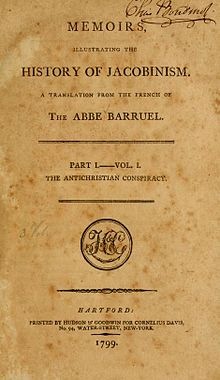
Back مذكرات توضح تاريخ اليعقوبية Arabic Paměti ukazující dějiny jakobínství Czech Mémoires pour servir à l'histoire du jacobinisme French זיכרונות להבהרת ההיסטוריה של היעקוביניזם HE Memorie per la storia del giacobinismo Italian
 Title Page of the First English Edition of Memoirs Illustrating the History of Jacobinism, 1799. | |
| Author | Abbé Augustin Barruel |
|---|---|
| Translator | Robert Clifford |
| Language | English |
| Publisher | Hudson & Goodwin |
Publication date | 1798–1799 |
| Publication place | England |
| Text | Memoirs Illustrating the History of Jacobinism at Internet Archive |
Memoirs Illustrating the History of Jacobinism (French: Mémoires pour servir à l’histoire du Jacobinisme) is a book by Abbé Augustin Barruel, a French Jesuit priest. It was written and published in French in 1797–98, and translated into English in 1799.
In the book, Barruel claims that the French Revolution was the result of a deliberate conspiracy or plot to overthrow the throne, altar and aristocratic society in Europe. The plot was allegedly hatched by a coalition of philosophes, Freemasons and the Order of the Illuminati. The conspirators created a system that was inherited by the Jacobins who operated it to its greatest potential. The Memoirs purports to expose the Revolution as the culmination of a long history of subversion. Barruel was not the first to make these charges but he was the first to present them in a fully developed historical context and his evidence was on a quite unprecedented scale. Barruel wrote each of the first three volumes of the book as separate discussions of those who contributed to the conspiracy. The fourth volume is an attempt to unite them all in a description of the Jacobins in the French Revolution. Memoirs Illustrating the History of Jacobinism is representative of the criticism of the Enlightenment that spread throughout Europe during the Revolutionary period.
Barruel's Memoirs are considered to be one of the founding documents of the right-wing interpretation of the French Revolution.[1] They became popular immediately after they were published and were read and commented on by most of the important literary and political journals of the day.[2] The four volumes of the text were published in a number of languages and created a debate about the role of the philosophes, their ideas, and the Enlightenment in the French Revolution. They remained in print well into the 20th century and contributed to the historical interpretation of the late 18th century in France. The success of Barruel's work is testimony to the anti-philosophical discourse that spread in the aftermath of the revolution. Barruel left behind a construction of the Enlightenment that was destined to influence subsequent interpretations. He wound accusations tightly around his foes and tied them into positions from which they could not escape.[3] The text created a link between the Enlightenment and the Revolution and this connection remains a topic of historical debate.